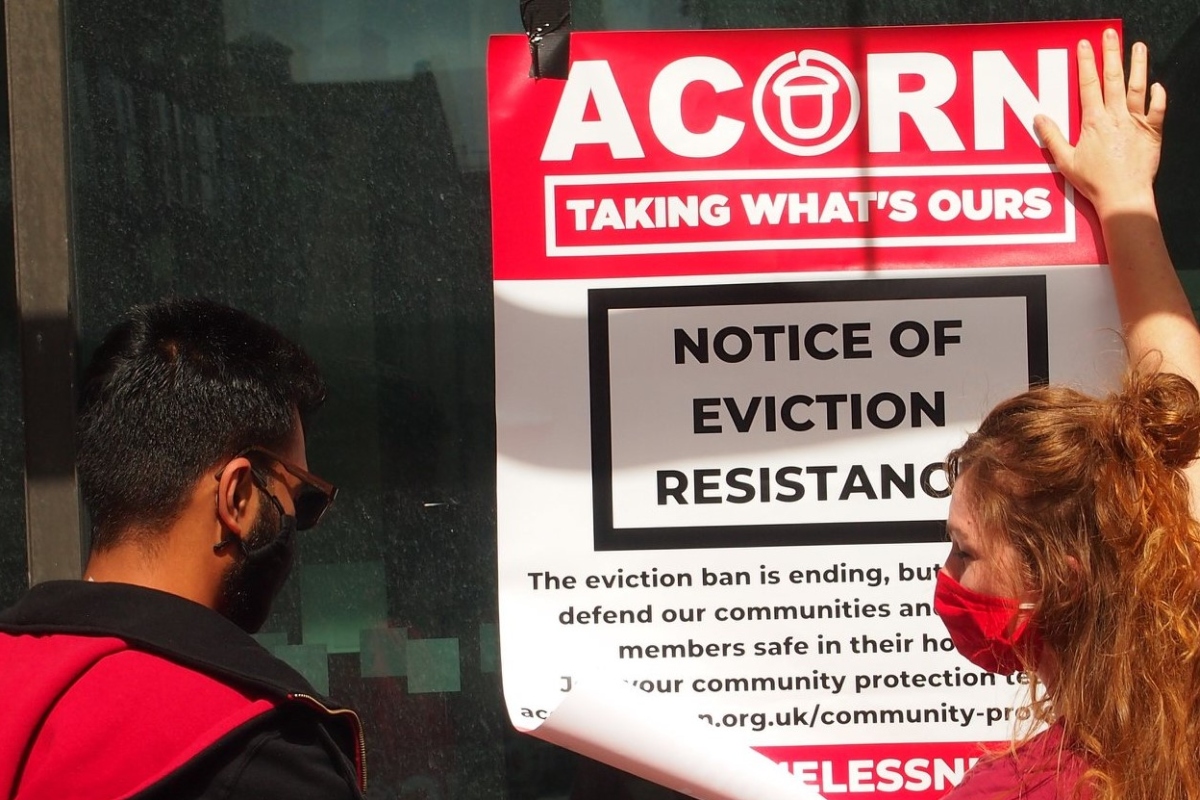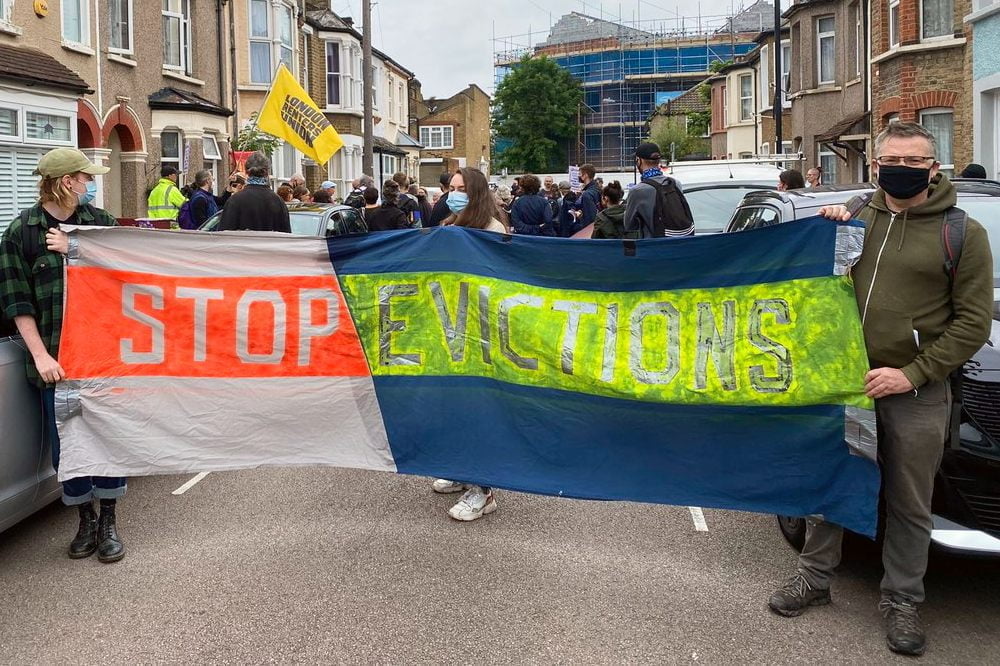As the eviction ban ends, renters everywhere are facing uncertainty. One mother’s determined resistance to her own removal shows the way forward. The labour movement must organise to fight against evictions, and for a socialist alternative.
Earlier this year, at the end of May, the ban on housing evictions – originally brought in at the start of the pandemic – came to an end.
It was around this time that Nadia Zaman received a letter from bailiffs stating she had just 20 days to move out of her privately rented home in Walthamstow, London.
Initially terrified, Nadia contacted people in the local community, who were outraged and wanted to help. 80 people showed up at her home, prepared to confront the bailiffs.
Under pressure, the local council temporarily rehoused Nadia and her family in the borough. In fact, catching wind of this act of resistance, the bailiffs were afraid to even show up!
This temporary accommodation, however, was a far cry from what Nadia needed. It was shared between ten people, with just one kitchen and bathroom.
And on top of these terrible conditions, Nadia was once again forced to face down the bailiffs. She was again at the risk of eviction – not only from this temporary accommodation, but from her whole life and community.
Into the fire again
What was the reason for this new eviction attempt? According to officials at Waltham Forest Council, it is because Nadia failed to attend a viewing arranged by the council for a property 130 miles away in Stoke-on-Trent – a place she has never even visited, nor has any connection to.
Nadia has lived in Walthamstow her whole life; her children go to school here, and her support network is in the borough. And to add insult to injury, the council would only pay half her travel fare from London to Stoke. No surprise, then, that she failed to make this appointment.
Following this, Nadia was given just 24 hours to leave her temporary accommodation, or she would no longer be eligible for any housing support, putting her at risk of homelessness. The council even threatened to change the locks and push Nadia and her kids out onto the street.
The community once again mobilised in response.
Successful eviction resistance in Waltham Forest, London this morning. Makes me feel good to be alive. Solidarity is Strengthen!!! ✊?✊?✊? pic.twitter.com/yUyYTAeRrx
— bisikletçi ? ?? (@aonraildubh) June 29, 2021
This is not the first time the council has tried to do this to local families. In July, Walthamstow resident Monica, her partner, and her three children were also evicted from their temporary accommodation for failing to view a property in Stoke-on-Trent, where she too has never visited.
And in November last year, Central London County Court ruled unlawful an attempt by Waltham Forest Council to rehome a disabled man in Wolverhampton, 130 miles away.
This is in spite of the surplus of housing in the borough, and with much more being built.
Following a day-long eviction resistance action on Tuesday 3 August, Nadia has now been offered temporary accommodation again in the borough.
Activists have made it clear, however, that if Nadia is not rehomed in the borough permanently, the community will return in even greater numbers.
How to fight evictions
Both Nadia and Monica immediately got into contact with members of their community and with the London Renters Union (LRU), who together mobilised the local community to stop their evictions.
These resistance efforts have been enthusiastically supported by local labour movement activists, including many Labour Party and Momentum members.
Disgracefully, however, Waltham Forest is a Labour-run council. Rank-and-file Labour members are having to fight these anti-worker actions by right-wing Labour councillors. And not for the first time.
Right now LRU members are taking part in the community action to support Nadia and her family to resist eviction from their home in Leyton. @wfcouncil why have you been trying to force Nadia and her children to move to all the way to Stoke? pic.twitter.com/fZZNiNi195
— London Renters Union (@LDNRentersUnion) August 3, 2021
It is clear that it is only by relying on our own strength and unity as a class that we can resist the wave of evictions that lie ahead, as the Tories, landlords, and bosses present the bill for the coronavirus crisis to the working class.
It is vital that the major trade unions – which have far bigger resources than smaller community unions – support these struggles. After all, workers’ lives do not end when they leave the workplace.
And while grassroots Labour members have been out supporting Nadia, she has rightly pointed out that, scandalously, the Labour Party – locally and nationally – hasn’t. Instead of supporting these struggles, right-wing Labour councils are in fact the ones carrying out these evictions.
Rotten Labour councils
 It is clear that Labour’s right-wing leaders and councillors will not resist such evictions or provide enough housing. Their aim is to protect landlords, not renters; to prioritise profits above the needs of workers.
It is clear that Labour’s right-wing leaders and councillors will not resist such evictions or provide enough housing. Their aim is to protect landlords, not renters; to prioritise profits above the needs of workers.
If Nadia wished to stay in the borough without council support, she would be at the mercy of the private market. At present, family homes in the borough are around £450 per week, on average. To put this into perspective, for someone working 40 hours per week, the ‘living wage’ in London amounts to £434.
But this is of no concern to the landlords, who continue to profit off of the misery of the working class.
And this crisis long predates the pandemic. As Nadia has pointed out, even before the pandemic she was faced with the prospect of eviction and homelessness.
The housing crisis, however, has nothing to do with a shortage of housing stock – as Nadia has pointed out: “I know there are empty homes in Walthamstow, including council flats.”
Rather than evicting tenants, a Labour council should instead take a leaf out of the book of the Liverpool Labour council in the 1980s.
The Liverpool councillors defied Thatcher and the Tories, building 5000 council homes and capping rents for social housing tenants. This provided employment for local construction workers, as well as homes fit for purpose.
Today’s right-wing Labour councillors are a far cry away from this inspiring example. And with Starmer looking to take the party back to Blairism, a determined struggle will be required to transform the labour movement into a weapon for fighting austerity and evictions.
So as well as mobilising against evictions on the street, Labour members should fight within the party for a socialist housing solution, and organise to replace councillors who are not prepared to implement bold socialist policies.
Socialist alternative
 These evictions are just one symptom of the housing crisis that the working class faces, in Britain and around the world. Over half a million renters are behind on rent payments, and are facing similar situations to Nadia and Monica.
These evictions are just one symptom of the housing crisis that the working class faces, in Britain and around the world. Over half a million renters are behind on rent payments, and are facing similar situations to Nadia and Monica.
It is clear that the housing crisis is far from an individual problem, but is a systemic one. As such, those looking to resist evictions – as well as mobilising on the streets – must fight against the system that gives rise to this crisis.
Parasitic landlords profit from the scarcity of housing. Investors make huge sums speculating on property. Private property developers do the same. It is clear, therefore, that the capitalists and their system are unable to solve the housing crisis.
As the party that was founded to represent the interests of the working class, Labour should state clearly that if capitalism cannot afford to house everybody, then we cannot afford capitalism.
To fight both homelessness and the housing crisis, we must therefore demand:
- A permanent ban on evictions.
- Scrapping of all COVID-related housing debts.
- Requisitioning of rooms at hotels and hostels for those sleeping on the streets, and for those required to self-isolate or quarantine.
- Expropriating empty properties used for speculation by investors.
- Bringing the properties and assets of the big landlords and management firms under public ownership and democratic control.
- Nationalising the major construction companies and banks, in order to carry out a mass programme of social housing construction.
Only on this basis can we eradicate homelessness and provide for the needs of workers.






